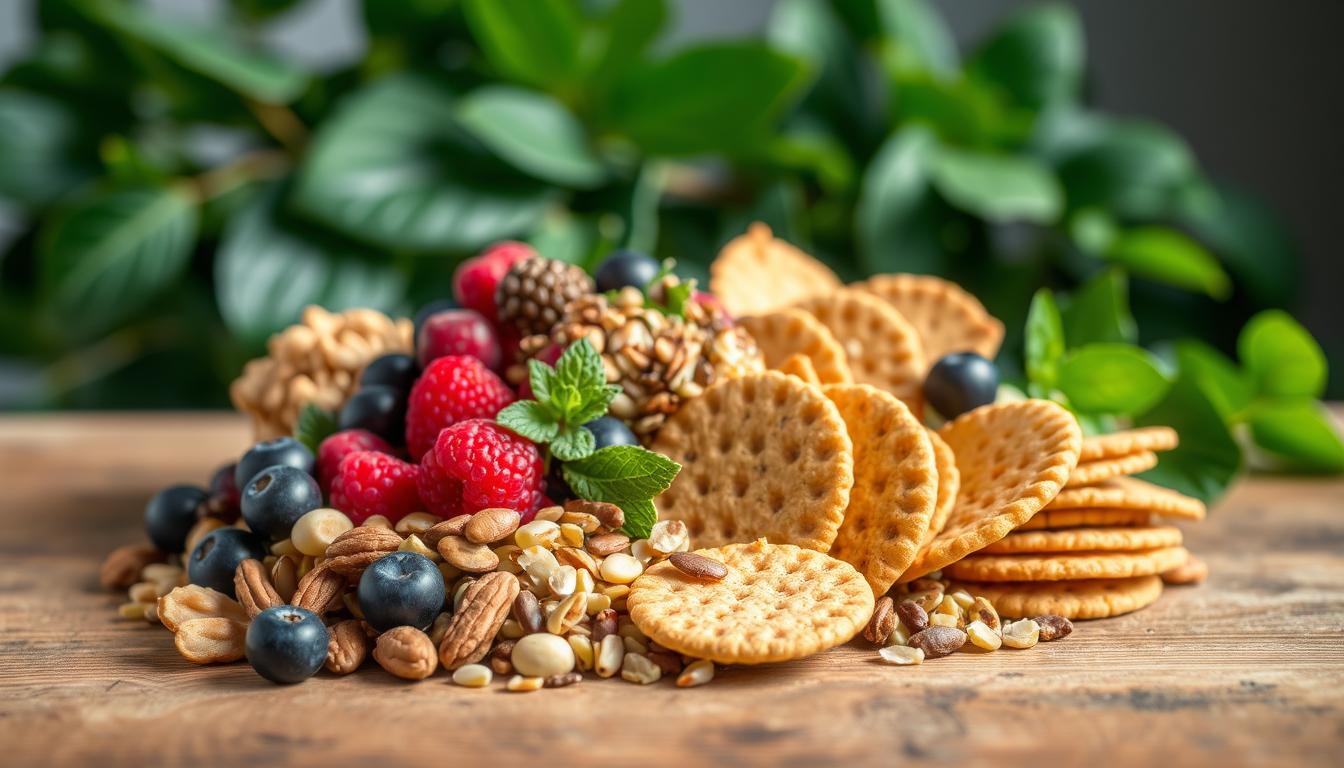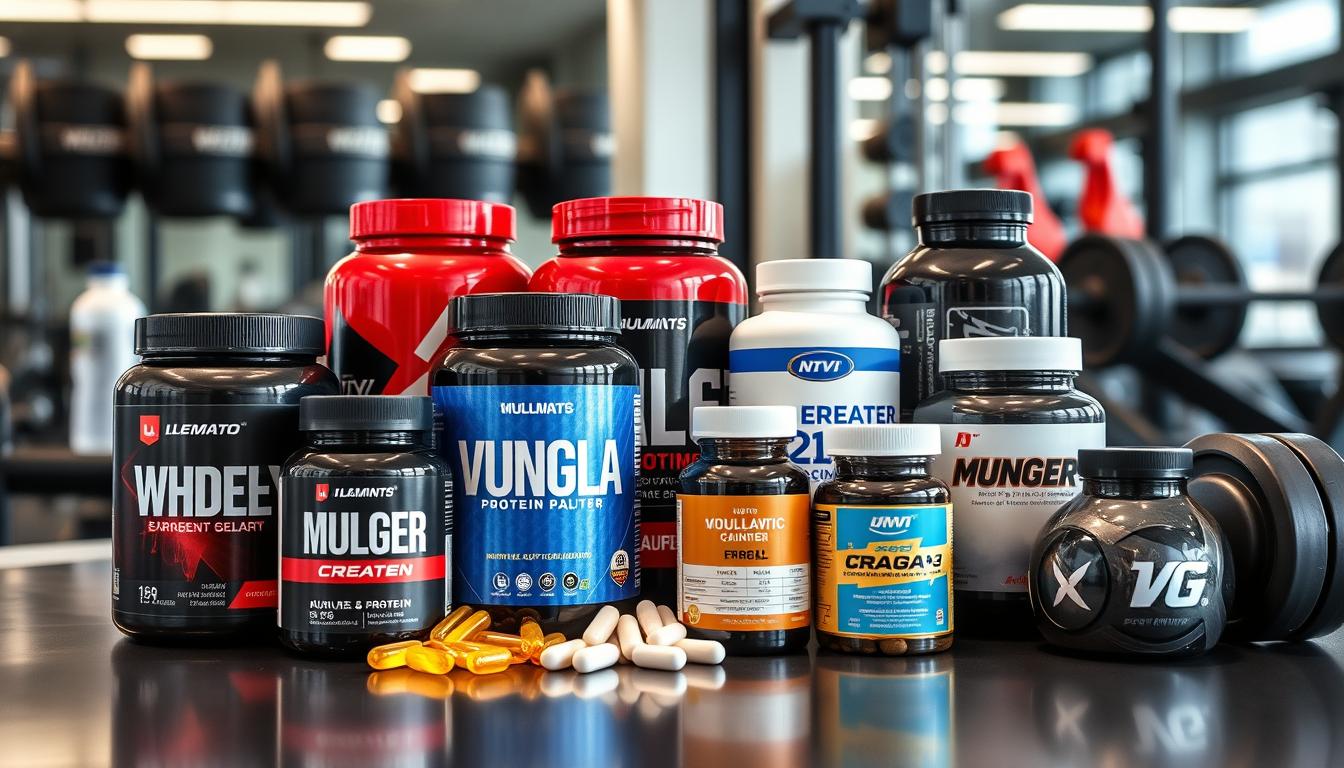New research shows eating a handful of special foods daily can help your heart. Experts say certain snacks are good for your cholesterol. They tell us to eat mindfully.
A study in the British Medical Journal found eating plants lowers heart disease risk by 22 percent. This shows how food choices affect our hearts1. It’s clear that small changes in what we eat can make a big difference in our heart health.
Key Takeaways
- Incorporating cholesterol-lowering foods into your daily diet can improve heart health.
- Experts recommend mindful eating and specific snacks to manage cholesterol levels.
- Plant-based diets are associated with a lower risk of heart disease.
- Simple daily dietary habits can contribute to long-term cardiovascular wellness.
- Research supports the benefits of nutrient-rich snacks for heart health.
Understanding Cholesterol and Its Importance
Cholesterol is key for heart health and well-being. It helps make hormones and build cells. Keeping cholesterol levels right is important for a healthy life and avoiding heart disease.
What Is Cholesterol?
Cholesterol is a waxy stuff in your blood. It’s needed for healthy cells. But too much can harm your heart. Knowing its role helps keep your heart healthy.
The Difference Between LDL and HDL Cholesterol
LDL and HDL cholesterol are different. LDL, or “bad” cholesterol, can clog arteries. HDL, or “good” cholesterol, helps clean out LDL. This balance is crucial for heart health2.
What you eat affects your cholesterol. Eating foods high in fiber, like fruits and veggies, helps lower cholesterol. But, eating too much fat and sugar can harm your heart.
Vegetarians have a lower heart disease risk than meat eaters. This shows how diet affects cholesterol levels. Making smart food choices is key for heart health.
| Cholesterol Type | Impact on Health |
|---|---|
| LDL Cholesterol | Plaque buildup in arteries, increases heart disease risk |
| HDL Cholesterol | Helps remove LDL cholesterol, supports heart health |
The Science Behind Snack Foods and Heart Health
Snack foods are key for heart health. They have fiber, unsaturated fats, and plant sterols. These help with cholesterol and heart health.
Key Nutrients That Influence Cholesterol Levels
Snack foods have good fats, fiber, and plant sterols. These are great for the heart. Good fats, like those in nuts, lower bad cholesterol.
Fiber, found in oats and beans, also helps. It binds to cholesterol and stops it from being absorbed. Most Americans don’t get enough fiber, which is bad for cholesterol and digestion.
Plant sterols in plant-based foods also help with cholesterol. They block cholesterol absorption in the gut. Eating nuts, seeds, and whole grains is good for the heart.
Research Insights from Nutritional Experts
Nutrition experts say to eat heart-healthy snacks. Nuts, seeds, and whole grains are good for cholesterol. Dr. Rao says to avoid foods high in nitrates, like cured meats, because they can cause health problems.
Studies show that fiber and plant sterols help manage cholesterol. Men need 35 to 38 grams of fiber a day. Women need about 25 grams2. Choosing snacks with these nutrients can improve heart health.
Recommended Snack Foods for Cholesterol Management
Choosing the right snacks can help manage cholesterol. Focus on nuts, seeds, and whole grains. These foods are good for your heart.
Nuts: A Heart-Healthy Choice
Almonds and walnuts are full of good fats. Eating a handful a day is good for your heart. They help lower bad cholesterol and reduce heart disease risk.
Seeds: Tiny Powerhouses of Nutrition
Flaxseeds and chia seeds are packed with nutrients. They have omega-3s and fiber. These tiny foods are great in smoothies or salads.
Whole Grains: Snacks That Satisfy and Support
Whole grains like oats and barley help with cholesterol. They are full of fiber, which is good for your heart. They also keep you full, helping with weight and heart health.
| Snack Food | Heart Health Benefits | Example Servings |
|---|---|---|
| Almonds | Lower LDL cholesterol | 1 ounce (23 almonds) |
| Walnuts | Improved cardiovascular health | 1 ounce (14 halves) |
| Flaxseeds | Rich in omega-3 fatty acids | 1 tablespoon |
| Chia Seeds | High in fiber and nutrients | 1 tablespoon |
| Oats | Lowering cholesterol levels | 1/2 cup cooked |
| Barley | Promotes satiety | 1/2 cup cooked |
Adding these snacks to your day can help with cholesterol. They also support your heart health.
The Role of Fiber in Lowering Cholesterol
Fiber is key in managing cholesterol. Soluble fiber helps remove cholesterol from the body. Eating fiber-rich snacks daily can lower cholesterol and improve heart health.
Soluble vs. Insoluble Fiber
Soluble fiber turns into a gel in water, helping lower cholesterol and blood sugar. Insoluble fiber helps move food through your body and makes stool bulkier. It’s good for those with constipation. Most Americans don’t get enough fiber, needing 35-38 grams a day for men and 25 grams for women.
Snack Ideas High in Soluble Fiber
It’s easy to make snacks rich in fiber. Here are some ideas:
- Legumes: Lentils and chickpeas add soluble fiber to your snacks.
- Fruits: Apples, berries, and citrus fruits are full of soluble fiber.
- Oats: Bob’s Red Mill Organic Quick Cooking Steel Cut Oats are tasty and affordable3.
- Nuts: A handful of nuts like Kirkland Signature Extra Fancy Mixed Nuts adds fiber and healthy fats.

Kirkland Signature Sunsweet Whole Dried Plums are also a tasty fiber boost.
Choosing the right snacks can greatly improve your heart health and lower cholesterol.
| Snack | Source | Benefits |
|---|---|---|
| Legumes | Lentils, Chickpeas | High in soluble fiber |
| Fruits | Apples, Berries, Citrus | Boosts soluble fiber intake |
| Oats | Bob’s Red Mill Organic Quick Cooking Steel Cut Oats | Cost-effective, high soluble fiber |
| Nuts | Kirkland Signature Extra Fancy Mixed Nuts | Contains fiber and healthy fats |
| Prunes | Kirkland Signature Sunsweet Whole Dried Plums | High in dietary fiber, antioxidants3 |
Portion Control: Finding the Right Amount
Controlling portions is key when snacking, especially for keeping cholesterol healthy. A “handful” of healthy snacks, like nuts or seeds, is about a quarter cup. This small amount can give big health benefits without too many calories.
Guidelines for a Healthy Handful
Following simple rules makes snacking easier. The American Heart Association says snacks should be about 150 calories each. A small handful of almonds or walnuts is perfect and good for your heart.
Also, making sure these snacks are part of a balanced diet helps your overall health.
Balancing Snacks with Daily Nutritional Needs
Adding snacks to a balanced diet means knowing your daily nutritional needs. Many Americans don’t get enough fiber, which is key for lowering cholesterol and regular bowel movements. Snacks like whole grains and leafy greens can help meet your fiber needs—35-38 grams for men and about 25 grams for women2.
Also, combining these snacks with regular exercise is good for your health. Aim for 10,000 steps a day and five workouts a week4.
Eating too fast or too much can cause problems like heartburn, bloating, and pain. So, it’s important to eat mindfully and control your portions. This is good for your cholesterol and your stomach health.
Lifestyle Changes to Complement Healthy Snacking
Healthy snacking is just one part of keeping your heart healthy. Adding lifestyle changes like moving more and managing stress is also key. These help control cholesterol and boost your overall health.
The Impact of Exercise on Cholesterol
Exercise has big benefits for your cholesterol. It raises the “good” HDL cholesterol and lowers the “bad” LDL cholesterol. Exercise also helps your blood flow better and balances your hormones, which can lower cholesterol.
Doing moderate activities like walking, cycling, or swimming for 30 minutes a day is great. These activities make your heart strong and help you stay at a healthy weight. This is good for your cholesterol levels.
Stress Management and Heart Health
Managing stress is crucial for your heart. Too much stress can raise your blood pressure and cholesterol, increasing heart disease risk. Mindfulness, meditation, and deep breathing can help reduce stress. Adding these to your daily life can improve your mental and physical health.
Combining exercise benefits and stress reduction makes a balanced lifestyle. These changes support healthy snacking and improve your heart health.
Potential Pitfalls: Snacks to Avoid
It’s important to know which snacks are bad for your health. Snacks with lots of sugar, artificial stuff, and trans fats are bad. These can make your heart disease risk go up.
Processed and Sugary Snack Foods
Many snack foods have too much sugar and unhealthy fats. This can mess with your cholesterol and cause health problems. Foods high in fat and sugar can also hurt your stomach.
Also, most Americans don’t eat enough fiber. This makes digestion and cholesterol control harder.
Understanding Trans Fats and Their Risks
Trans fats are bad, found in things like margarine and fried foods. They raise bad cholesterol and lower good cholesterol. This is not good for your heart2.
Foods with nitrates, like cured meats, can also be risky. They might increase cancer risk in your stomach. So, it’s best to stay away from foods with trans fats.
How to Incorporate Snacks into Your Daily Routine
Adding snacks to your daily routine can boost your health. A good eating plan with snacks keeps you full and gives you energy. It also stops you from getting too hungry.
Healthy Snack Timing for Optimal Benefits
Snacking at the right times helps control hunger and keeps you energized. It’s best to snack between meals. This way, you avoid getting too hungry or eating too much at meals.
For example, a healthy snack in the morning and another in the afternoon keeps you going. Men need 35 to 38 grams of fiber a day. Women need about 25 grams. Eating foods high in fiber, like leafy greens, helps with digestion and prevents constipation.
Mixing and Matching for Variety
It’s important to mix up your snacks. Don’t eat the same thing every day. Try nuts, fruits, seeds, veggies, and whole grains.
Kirkland Signature Extra Fancy Mixed Nuts are a tasty and healthy choice. Bob’s Red Mill Organic Quick Cooking Steel Cut Oats are also a good option3.
Changing up the textures and tastes makes snacking fun. Eating a variety of foods helps you get all the nutrients you need. Snap Kitchen meals offer different proteins and veggies for various diets5.
Choosing snacks that you like and fit your diet makes it easy. With some planning, snacks can help you stay healthy and keep your cholesterol in check.
Success Stories: Real Results from Snack Choices
Many people have seen big changes in their health by changing what they snack on. Stories from real people and advice from experts show how important it is to choose snacks wisely.
Testimonials from Individuals
A 22-year-old from Dallas, Texas, lost 66 pounds by eating better and staying active. They ate Greek yogurt, almonds, and carrots with ranch. They also worked out hard at the gym and walked a lot every day4.
Expert Opinions on Snacking Habits
Nutrition experts say it’s key to snack right. Adults need 0.8-1 gram of protein for every kilogram of body weight to keep muscles strong. They also suggest eating 1.5-2 cups of fruit and 2-3 cups of veggies every day6.
Eating fiber-rich fruits before meals can cut down calories by 18.5%. This helps with weight control and keeps you healthy.
Also, eating three to five servings of whole grains a day can help your metabolism. This boosts your health. Following these tips and stories shows how snacking right is key to good health and cholesterol levels.
Building a Balanced Snack Plan
Creating a balanced snack plan is important. It should match your dietary needs and health goals. Each snack should fit your specific needs, like vegan, gluten-free, or heart health.
By planning your snacks well, you can improve your health. It’s a big part of staying well.
Sample Snack Plans for Different Dietary Preferences
It’s key to make snack plans for different diets. Here are some ideas:
- Vegan: Hummus with carrot sticks, mixed nuts with dried fruit, or avocado on whole-grain toast.
- Gluten-Free: Greek yogurt with berries, rice cakes with almond butter and banana slices, or a quinoa salad with mixed vegetables.
- Vegetarian: A hard-boiled egg with cucumbers, apple slices with cheddar cheese, or a smoothie with spinach, banana, and almond milk.
A 2019 study found vegetarians have a 22 percent lower heart disease risk than meat eaters. This shows the benefits of plant-based snacks1.
Customizing Your Snacks for Personal Health Goals
Customizing snacks for health goals is crucial. For cholesterol, eat fiber and healthy fats like nuts and seeds. Pulmonary rehab helps those with lung disease, like COPD.
Choosing oven-baked chips over mashed potatoes cuts fat intake8.
Here are snack ideas for health goals:
| Health Goal | Recommended Snacks |
|---|---|
| Cholesterol Management | Mixed nuts, whole grain crackers with guacamole, apple slices with peanut butter |
| Weight Loss | Air-popped popcorn, cucumber slices with hummus, boiled eggs |
| Energy Boost | Smoothies with spinach and bananas, trail mix with dried fruits, yogurt with granola |

By planning snacks, you can manage your health goals better. It helps keep your eating balanced.
Myths and Misconceptions About Snacking
Many people believe wrong things about snacks. They think all snacks are bad for health or make you gain weight. But, the right snacks can be good for you. They give you important nutrients and keep your energy up all day.
Debunking Common Snack Food Myths
One big myth is that all snacks make you gain weight. But, snacks with fiber, protein, and healthy fats can help you stay healthy. For example, “Kirkland Signature Extra Fancy Mixed Nuts, Unsalted (2.5 lb. bag)” has good fats, protein, and fiber.
“Seeds of Change, Organic Quinoa and Brown Rice with Garlic” has lots of fiber. This helps keep your blood sugar levels right.
Clarifying the Role of Snacks in a Healthy Diet
Some people think snacks are always bad. But, snacks can be part of a healthy diet. “Bob’s Red Mill Organic Quick Cooking Steel Cut Oats” has fiber that’s good for your heart.
“Kirkland Signature Protein Bar, Variety Pack” has protein and fiber. It also has less sugar. This helps keep your muscles strong and your digestive system healthy.
Understanding snacks can help you make better choices. Knowing the truth about snacks can lead to healthier eating.
Conclusion: Embracing Healthy Snacking Habits
Starting your health journey is easy. Just add mindful snacking to your day. Knowing how it helps can make you choose better foods. This can help you reach your health goals.
The Long-Term Benefits of Mindful Snacking
Mindful snacking is good for you over time. It helps control cholesterol and keeps your heart healthy. It also helps you stay at a good weight.
This way of eating makes you feel better. It also helps you have a better relationship with food.
Encouraging a Positive Approach to Snack Choices
Being mindful of what you eat is key. Choose snacks that are full of nutrients like nuts and whole grains. This makes your snacks better for you.
By doing this, you live a healthier life. It helps you feel better for a long time.
Adding mindful snacking to your life is a big step. It helps you pick better snacks and be more aware of your eating. This sets you up for a healthier life and a good relationship with food.
FAQ
How can daily snacks help in lowering cholesterol?
Eating healthy snacks every day can lower cholesterol. Foods like nuts, seeds, and whole grains are good. They help reduce bad cholesterol and improve heart health.
What are some recommended cholesterol-lowering snack foods?
Experts say nuts, seeds, and whole grains are great. Almonds, walnuts, flaxseeds, chia, oats, and barley are good choices. They help keep you full and support heart health.
What is cholesterol and why is it important?
Cholesterol is important for our body. It helps make hormones and build cells. There’s good and bad cholesterol. We need to keep the bad cholesterol low.
How does soluble fiber help in lowering cholesterol?
Soluble fiber grabs onto cholesterol and helps remove it. Foods like legumes, apples, and berries are full of it. Eating them as snacks can lower cholesterol.
What is the role of portion control in healthy snacking?
Eating the right amount is key. A handful of nuts or seeds is enough. It’s good for health without too many calories.
What lifestyle changes support cholesterol management alongside healthy snacks?
Being active and managing stress is important. Exercise boosts good cholesterol and lowers bad. Eating well and avoiding junk snacks also helps.
Which snacks should be avoided to maintain healthy cholesterol levels?
Stay away from snacks with lots of sugar, artificial stuff, and trans fats. They raise bad cholesterol and heart disease risk. Most processed snacks are bad.
How can snacks be incorporated into a daily routine for optimal benefits?
Eat healthy snacks between meals to stay full and energized. Mix up your snacks to get different nutrients. Choose snacks that fit your health goals and taste.
Can healthy snacking habits lead to real health improvements?
Yes, many people have seen big health improvements by changing their snacks. Choosing the right snacks and sticking to it is key.
What are some common myths about snacking and cholesterol?
Some think all snacks are bad or lead to weight gain. But, the right snacks in the right amounts are good. They give us nutrients and energy.



